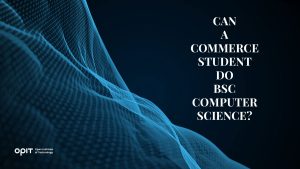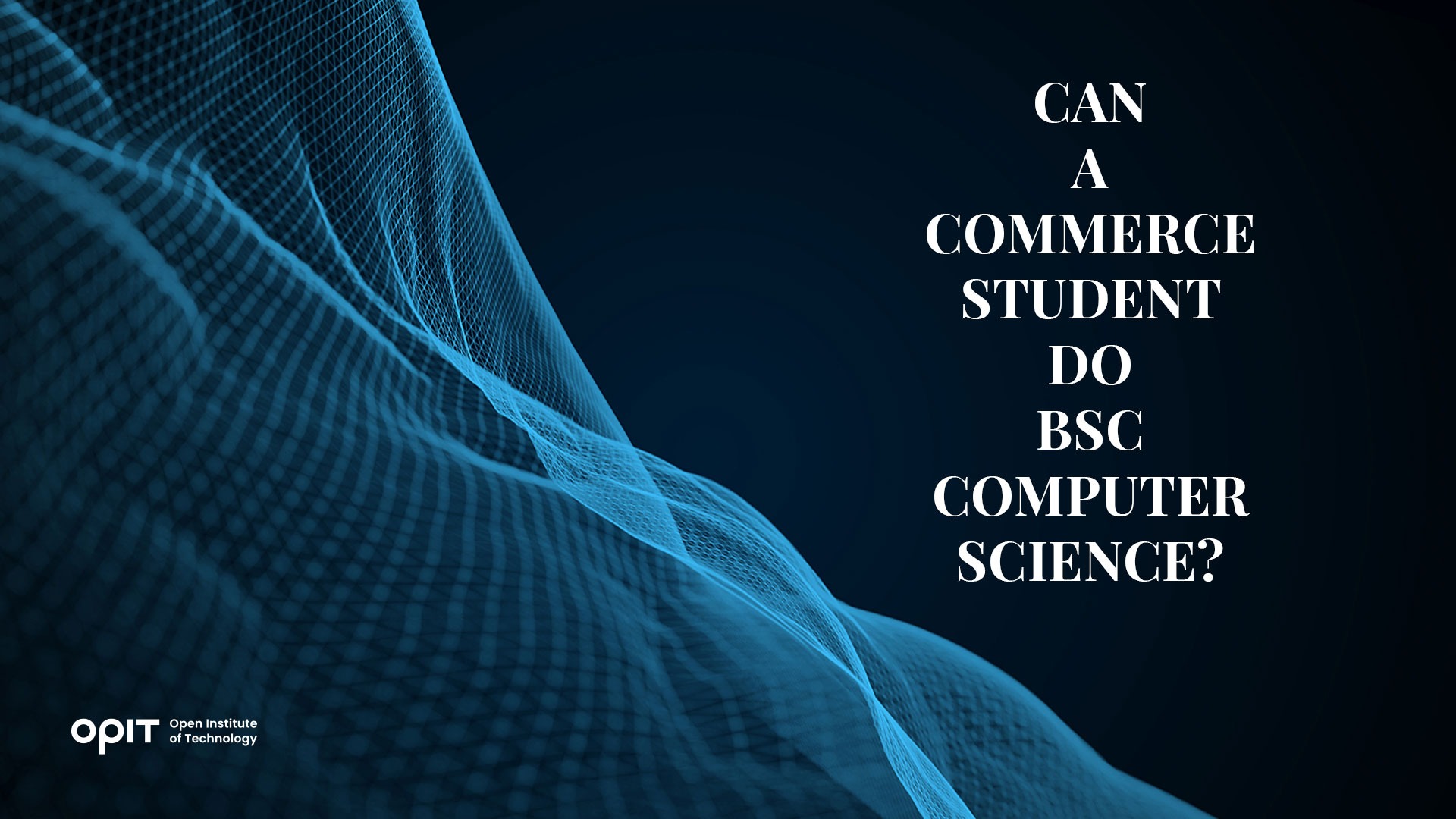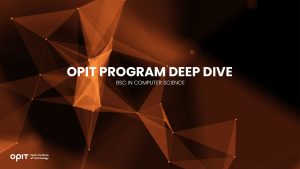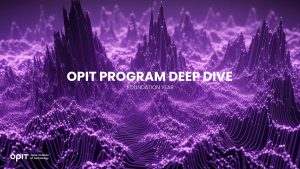

According to Data USA, degrees in the business field are among the most popular in the United States, with 840,116 degrees in this field alone being awarded in 2020. You went down the commerce route (meaning you have a grasp of business administration, accounting, and applied economics) and now you’re interested in practical applications of your knowledge.
With your commerce degree firmly under your belt, you may feel like a ship without a rudder – aimless and having no idea what direction to go. Happily, the tech field is ready and waiting for you, as a career in computer sciences may await. Here, we ask, “can a commerce student do BSc Computer Science?” The answer may surprise you, especially if you’re worried that a computer science degree’s eligibility requirements are outside the scope of what you learned in your commerce studies.
Background on Commerce and Computer Science
On the surface, commerce and computer science may seem like they go together as well as peanut butter and granite. But if you dig a little deeper into the scope of each subject, you start to realize that there’s more crossover than there first appears:
- Commerce – A degree in commerce gives you a firm grasp of the numbers that lie behind the scenes in a business, with banking, economics, and accounting all falling under your developing areas of expertise. Analytics is also a key part of these courses (especially in the research and data analyst fields), which is where we see some crossover with computer science.
- Computer Science – If commerce is all about the behind-the-scenes numbers in business, computer science handles what goes on under the hood in computing. Software development, data modeling, and analysis all fall under the computer science graduate’s remit, with the ability to pore through data to come to conclusions being essential to this technical subject.
It’s in the analysis that we start to see similarities between commerce and computer science emerge. Yes, commerce focuses more on the numbers behind businesses (and wider economic trends), but the ability to understand the data presented and report on what you see has applications in the computer science field. There’s not a direct crossover, as computer science will require you to learn the “language” in which computers speak, but they are many soft skills you develop in a commerce degree that apply to computer science.
Eligibility for BSc Computer Science
The key questions to ask when considering the issue of whether can commerce student do BSc Computer Science split into two categories:
- The general eligibility requirements to study a BSc in computer science
- Specific requirements that apply to commerce students
Eligibility Criteria for BSc Computer Science
BSc Computer Science degrees don’t require a great deal of computer know-how (though it helps), instead focusing on your grasp of mathematics. Requirements include the following:
- A high school diploma (or your country’s equivalent) that shows solid performance in mathematical subjects.
- Some degrees require you to achieve a specific Grade Point Average (GPA), though the specific GPA varies depending on where you apply.
- A high level of English proficiency, which can be measured using one (or both) of the following tests:
- IELTS – Get a minimum score between 6.0 and 7.0
- TOEFL – Get a minimum score between 90 and 100
Beyond these educational requirements, international students may need to submit copies of their passport and Visa, alongside certified academic transcripts to show they’ve achieved their country’s equivalents of the above grades. Not all courses require this of international students, with some online universities focusing more on your academic skills and less on your country of origin.
In terms of entrance exams, some colleges enforce computer science-specific exams (such as the CUET or CUCET), while others use NPATS or similar, more general exams, to determine proficiency.
Eligibility Criteria for Commerce Students
You may be standing at the starting line of your educational journey, meaning you’ve not yet applied to start your degree in commerce. First, congratulations on thinking so far ahead that you’re wondering “Can a commerce student do BSc Computer Science?” And second, you need to know what high school subjects help you get onto this degree path.
Commerce is a form of business degree, meaning any high school subjects that apply to the economic world help. Subjects like math, finance, economics, and foreign languages are obvious choices. The likes of marketing and computer applications also help (with the latter also laying some groundwork for your later computer science studies.
Much like computer science, you’ll likely have to take an entrance exam when applying to study commerce at most universities. The CSEET, CUET, and SET are common choices, with the first of these exams focusing specifically on those who study commerce to work as company secretaries.
The Possibility of Flexible Eligibility Criteria
Not all colleges require you to take entrance exams, with some even using broader strokes for their eligibility requirements to the point where they provide flexibility for both commerce and computer science students.
Colleges with open curriculums (such as Brown University and Hamilton College) offer more freedom in terms of what you study, with their entry requirements being more flexible as a result. Online institutions, such as the Open Institute of Technology (OPIT) may also offer more flexible entry criteria, sometimes allowing you to transfer credit from one course to another. That type of credit transfer may be ideal for you if you start a degree in commerce only to later decide to go down the computer science route.
Career Prospects for Commerce Students in Computer Science
When it comes to careers for those who hold computer science degrees, the obvious heavy-hitters are software and web development, IT management, and systems architecture. There are also exciting careers in the emerging AI fields that take full advantage of the technical skills you’ll develop as part of a BSc in computer science.
As for the career crossover between commerce and computer science, the key is to think about the skills that a commerce degree gives you that can apply in the computing field. Such skills include the following:
- Analytical Skills – Much like computer science, commerce is all about analyzing the data presented so you can report (and leverage) it for other purposes. Your ability to sit down and pore through the numbers will take you a long way in a computer-related role.
- Problem-Solving Skills – Closely linked to analytical skills, the ability to solve problems requires you to see the data at hand and come up with solutions while accounting for any restrictions presented. In creating commerce models, those restrictions may relate to budget and competencies, while computer science asks you to solve problems while taking system capabilities and limitations into account.
- Communication and Teamwork – Though often considered soft skills (as opposed to the “hard” technical skills you learn in a commerce degree), communication and teamwork are vital. If you need proof, try to work alone in any technical career and you’ll see why it’s so crucial to have these skills.
Potential Career Paths for Commerce Students with a BSc in Computer Science
With so much crossover potential between commerce and computer science, it’s clear that the answer to the question can a commerce student do BSc Computer Science is a resounding “yes.” And once you’ve completed your studies, several career paths await:
- Data Analyst – Reviewing data to find insights (be that into businesses or computer systems) are part of the remit for a data analyst. This role is all about problem-solving, which is a skill you’ll develop in abundance as a commerce and computer science student.
- Business Analyst – Take the ability to gather insights that is required of a data analyst and apply it specifically to areas of improvement in a business to become a business analyst. You’ll combine technical knowledge of a company’s inner workings with complex financial (and computational) models.
- IT Consultant – More computer science-centric than commerce-focused, IT consultants deal with the hows and whys of the computer networks businesses build. Your commerce skills will still come into play though, particularly when explaining how IT benefits businesses financially.
- Financial Technology Specialist – Combining the best of both worlds, this role combines the accounting skills you develop studying commerce with the technical ability needed to understand software and its functions.
Challenges and Considerations for Commerce Students
Though it’s possible for a commerce student to study (and succeed in) computer science, there are some challenges to consider.
The Technical Nature of Computer Science
As you learn the language of numbers in a commerce degree, so must you learn the language of machines when studying computer science. Getting to grips with the lingo (not to mention coding) can present a challenge to more business-minded students.
Balancing Your Workload
There’s an old saying that goes “Don’t burn the candle at both ends,” which is a warning not to pack too much onto your work plate. If you study commerce and computer science simultaneously, there’s a risk you may push yourself too far. Avoiding burnout requires finding the balance between your studies and personal time.
Networking and Practical Experience
As a commerce student, you understand that the world of business is as much about who you know as what you know. Finding the right people to take a chance on you, thus giving you practical experience, can be tough. But when armed with a pair of degrees in subjects that complement one another, you’re in a better position to build connections with people who can help you go far.
From Commerce to Computing – Is It Right for You?
So, can a commerce student do BSc Computer Science?
The answer isn’t just “yes,” but that it’s actually a great direction to go. Where a commerce degree equips you with a nice mix of technical knowledge and soft skills, a computer science course gives you even more practical knowledge that allows you to enter more specialized fields. However, your interest in each subject plays a role, as your ability (and passion) for studying hinges on your desire to dig into the more technical world of computing.
Assuming you have a genuine interest (and meet the appropriate eligibility criteria), supplementing your commerce studies with computer science can open up many career paths.
Related posts

Computer Science is fast becoming one of the most valuable fields of study, with high levels of demand and high-salaried career opportunities for successful graduates. If you’re looking for a flexible and rewarding way to hone your computing skills as part of a supportive global community, the BSc in Computer Science at the Open Institute of Technology (OPIT) could be the perfect next step.
Introducing the OPIT BSc in Computer Science
The OPIT BSc in Computer Science is a bachelor’s degree program that provides students with a comprehensive level of both theoretical and practical knowledge of all core areas of computer science. That includes the likes of programming, databases, cloud computing, software development, and artificial intelligence.
Like other programs at OPIT, the Computer Science BSc is delivered exclusively online, with a mixture of recorded and live content for students to engage with. Participants will enjoy the instruction of world-leading lecturers and professors from various fields, including software engineers at major tech brands and esteemed researchers, and will have many paths open to them upon graduation.
Graduates may, for example, seek to push on with their educational journeys, progressing on to a specialized master’s degree at OPIT, like the MSc in Digital Business and Innovation or the MSc in Responsible Artificial Intelligence. Or they could enter the working world in roles like software engineer, data scientist, web developer, app developer, or cybersecurity consultant.
The bullets below outline the key characteristics of this particular course:
- Duration: Three years in total, spread across six terms.
- Content: Core courses for the first four terms, a student-selected specialization for the fifth term, and a capstone project in the final term.
- Focus: Developing detailed theoretical knowledge and practical skills across all core areas of modern computer science.
- Format: Entirely online, with a mixture of live lessons and asynchronous content you can access 24/7 to learn at your own pace.
- Assessment: Progressive assessments over the course of the program, along with a capstone project and dissertation, but no final exams.
What You’ll Learn
Students enrolled in the BSc in Computer Science course at OPIT will enjoy comprehensive instruction in the increasingly diverse sectors that fall under the umbrella of computer science today. That includes a close look at emerging technologies, like AI and machine learning, as well as introductions to the fundamental skills involved in designing and developing pieces of software.
The first four terms are the same for all students. These will include introductions to software engineering, computer security, and cloud computing infrastructure, as well as courses focusing on the core skills that computer scientists invariably need in their careers, like project management, quality assurance, and technical English.
For the fifth term, students will have a choice. They can select five electives from a pool of 27, or select one field to specialize in from a group of five. You may choose to specialize in all things cybersecurity, for example, and learn about emerging cyber threats. Or you could focus more on specific elements of computer science that appeal to your interests and passions, such as game development.
Who It’s For
The BSc in Computer Science program can suit a whole range of prospective applicants and should appeal to anyone with an interest or passion for computing and a desire to pursue a professional career in this field. Whether you’re seeking to enter the world of software development, user experience design, data science, or another related sector, this is the course to consider.
In addition, thanks to OPIT’s engaging, flexible, and exclusively online teaching and learning systems, this course can appeal to people from all over the globe, of different ages, and from different walks of life. It’s equally suitable for recent high school graduates with dreams of making their own apps to seasoned professionals looking to broaden their knowledge or transition to a different career.
The Value of the BSc in Computer Science Course at OPIT
Plenty of universities and higher education establishments around the world offer degrees in computer science, but OPIT’s program stands out for several distinctive reasons.
Firstly, as previously touched upon, all OPIT courses are delivered online. Students have a schedule of live lessons to attend, but can also access recorded content and digital learning resources as and when they choose. This offers an unparalleled level of freedom and flexibility compared to more conventional educational institutions, putting students in the driving seat and letting them learn at their own pace.
OPIT also aims not merely to impart knowledge through lectures and teaching, but to actually help students gain the practical skills they need to take the next logical steps in their education or career. In other words, studying at OPIT isn’t simply about memorizing facts and paragraphs of text; it’s about learning how to apply the knowledge you gain in real-world settings.
OPIT students also enjoy the unique benefits of a global community of like-minded students and world-leading professors. Here, distance is no barrier, and while students and teachers may come from completely different corners of the globe, all are made to feel welcome and heard. Students can reach out to their lecturers when they feel the need for guidance, answers, and advice.
Other benefits of studying with OPIT include:
- Networking opportunities and events, like career fairs, where you can meet and speak with representatives from some of the world’s biggest tech brands
- Consistent support systems from start to finish of your educational journey in the form of mentorships and more
- Helpful tools to expedite your education, like the OPIT AI Copilot, which provides personalized study support
Entry Requirements and Fees
To enroll in the OPIT BSc in Computer Science and take your next steps towards a thrilling and fulfilling career in this field, you’ll need to meet some simple criteria. Unlike other educational institutions, which can impose strict and seemingly unattainable requirements on their applicants, OPIT aims to make tech education more accessible. As a result, aspiring students will require:
- A higher secondary school leaving certificate at EQF Level 4, or equivalent
- B2-level English proficiency, or higher
Naturally, applicants should also have a passion for computer science and a willingness to study, learn, and make the most of the resources, community, and support systems provided by the institute.
In addition, if you happen to have relevant work experience or educational achievements, you may be able to use these to skip certain modules or even entire terms and obtain your degree sooner. OPIT offers a comprehensive credit transfer program, which you can learn more about during the application process.
Regarding fees, OPIT also stands out from the crowd compared to conventional educational institutions, offering affordable rates to make higher tech education more accessible. There are early bird discounts, scholarship opportunities, and even the option to pay either on a term-by-term basis or a one-off up-front fee.

The Open Institute of Technology (OPIT) provides a curated collection of courses for students at every stage of their learning journey, including those who are just starting. For aspiring tech leaders and those who don’t quite feel ready to dive directly into a bachelor’s degree, there’s the OPIT Foundation Program. It’s the perfect starting point to gain core skills, boost confidence, and build a solid base for success.
Introducing the OPIT Foundation Year Program
As the name implies, OPIT’s Foundation Program is about foundation-level knowledge and skills. It’s the only pre-bachelor program in the OPIT lineup, and successful students on this 60-ECTS credit course will obtain a Pre-Tertiary Certificate in Information Technology upon its completion. From there, they can move on to higher levels of learning, like a Bachelor’s in Digital Business or Modern Computer Science.
In other words, the Foundation Program provides a gentle welcome into the world of higher technological education, while also serving as a springboard to help students achieve their long-term goals. By mixing both guided learning and independent study, it also prepares students for the EQF Level 4 experiences and challenges they’ll face once they enroll in a bachelor’s program in IT or a related field.
Here’s a quick breakdown of what the OPIT Foundation Program course involves:
- Duration: Six months, split into two terms, with each term lasting 13 weeks
- Content: Three courses per term, with each one worth 10 ECTS credits, for a total of 60
- Focus: Core skills, like mathematics, English, and introductory-level computing
- Format: Video lectures, independent learning, live sessions, and digital resources (e-books, etc.)
- Assessment: Two to three assessments over the course of the program
What You’ll Learn
The OPIT Foundation Program doesn’t intensely focus on any one particular topic, nor does it thrust onto you the more advanced, complicated aspects of technological education you would find in a bachelor’s or master’s program. Instead, it largely keeps things simple, focusing on the basic building blocks of knowledge and core skills so that students feel comfortable taking the next steps in their studies.
It includes the following courses, spread out across two terms:
- Academic Skills
- Mathematics Literacy I
- Mathematics Literacy II
- Internet and Digital Technology
- Academic Reading, Writing, and Communication
- Introduction to Computer Hardware and Software
Encompassing foundational-level lessons in digital business, computer science, and computer literacy, the Foundation Program produces graduates with a commanding knowledge of common operating systems. Exploring reading and writing, it also helps students master the art of communicating their ideas and responses in clear, academic English.
Who It’s For
The Foundation Year program is for people who are eager to enter the world of technology and eventually pursue a bachelor’s or higher level of education in this field, but feel they need more preparation. It’s for the people who want to work on their core skills and knowledge before progressing to more advanced topics, so that they don’t feel lost or left behind later on.
It can appeal to anyone with a high school-level education and ambitions of pushing themselves further, and to anyone who wants to work in fields like computer science, digital business, and artificial intelligence (AI). You don’t need extensive experience or qualifications to get started (more on that below); just a passion for tech and the motivation to learn.
The Value of the Foundation Program
With technology playing an increasingly integral role in the world today, millions of students want to develop their tech knowledge and skills. The problem is that technology-oriented degree courses can sometimes feel a little too complex or even inaccessible, especially for those who may not have had the most conventional educational journeys in the past.
While so many colleges and universities around the world simply expect students to show up with the relevant skills and knowledge to dive right into degree programs, OPIT understands that some students need a helping hand. That’s where the Foundation Program comes in – it’s the kind of course you won’t find at a typical university, aimed at bridging the gap between high school and higher education.
By progressing through the Foundation Program, students gain not just knowledge, but confidence. The entire course is aimed at eliminating uncertainty and unease. It imbues students with the skills and understanding they need to push onward, to believe in themselves, and to get more value from wherever their education takes them next.
On its own, this course won’t necessarily provide the qualifications you need to move straight into the job market, but it’s a vital stepping stone towards a degree. It also provides numerous other advantages that are unique to the OPIT community:
- Online Learning: Enjoy the benefits of being able to learn at your own pace, from the comfort of home, without the costs and inconveniences associated with relocation, commuting, and so on.
- Strong Support System: OPIT professors regularly check in with students and are on hand around the clock to answer queries and provide guidance.
- Academic Leaders: The OPIT faculty is made up of some of the world’s sharpest minds, including tech company heads, experienced researchers, and even former education ministers.
Entry Requirements and Fees
Unlike OPIT’s other, more advanced courses, the Foundation Program is aimed at beginners, so it does not have particularly strict or complex entry requirements. It’s designed to be as accessible as possible, so that almost anyone can acquire the skills they need to pursue education and a career in technology. The main thing you’ll need is a desire to learn and improve your skills, but applicants should also possess:
- English proficiency at level B2 or higher
- A Secondary School Leaving Certificate, or equivalent
Regarding the fees, OPIT strives to lower the financial barrier of education that can be such a deterrent in conventional education around the world. The institute’s tuition fees are fairly and competitively priced, all-inclusive (without any hidden charges to worry about), and accessible for those working with different budgets.
Given that all resources and instruction are provided online, you can also save a lot of money on relocation and living costs when you study with OPIT. In addition, applicants have the option to pay either up front, with a 10% discount on the total, or on a per-term basis, allowing you to stretch the cost out over a longer period to ease the financial burden.
Have questions?
Visit our FAQ page or get in touch with us!
Write us at +39 335 576 0263
Get in touch at hello@opit.com
Talk to one of our Study Advisors
We are international
We can speak in:


